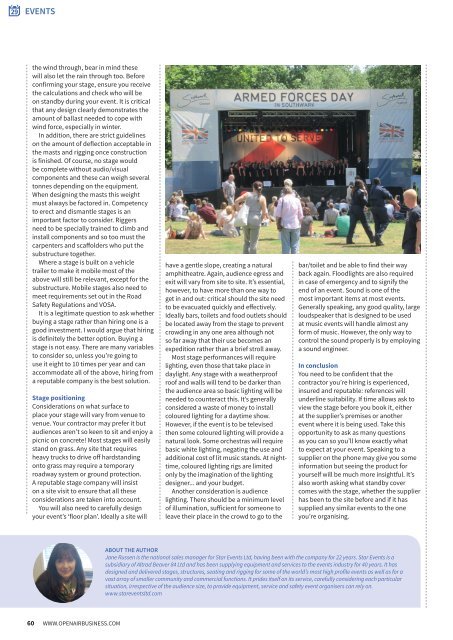Open Air Business May 2016
The UK's outdoor hospitality business magazine
The UK's outdoor hospitality business magazine
You also want an ePaper? Increase the reach of your titles
YUMPU automatically turns print PDFs into web optimized ePapers that Google loves.
EVENTS<br />
the wind through, bear in mind these<br />
will also let the rain through too. Before<br />
confirming your stage, ensure you receive<br />
the calculations and check who will be<br />
on standby during your event. It is critical<br />
that any design clearly demonstrates the<br />
amount of ballast needed to cope with<br />
wind force, especially in winter.<br />
In addition, there are strict guidelines<br />
on the amount of deflection acceptable in<br />
the masts and rigging once construction<br />
is finished. Of course, no stage would<br />
be complete without audio/visual<br />
components and these can weigh several<br />
tonnes depending on the equipment.<br />
When designing the masts this weight<br />
must always be factored in. Competency<br />
to erect and dismantle stages is an<br />
important factor to consider. Riggers<br />
need to be specially trained to climb and<br />
install components and so too must the<br />
carpenters and scaffolders who put the<br />
substructure together.<br />
Where a stage is built on a vehicle<br />
trailer to make it mobile most of the<br />
above will still be relevant, except for the<br />
substructure. Mobile stages also need to<br />
meet requirements set out in the Road<br />
Safety Regulations and VOSA.<br />
It is a legitimate question to ask whether<br />
buying a stage rather than hiring one is a<br />
good investment. I would argue that hiring<br />
is definitely the better option. Buying a<br />
stage is not easy. There are many variables<br />
to consider so, unless you’re going to<br />
use it eight to 10 times per year and can<br />
accommodate all of the above, hiring from<br />
a reputable company is the best solution.<br />
Stage positioning<br />
Considerations on what surface to<br />
place your stage will vary from venue to<br />
venue. Your contractor may prefer it but<br />
audiences aren’t so keen to sit and enjoy a<br />
picnic on concrete! Most stages will easily<br />
stand on grass. Any site that requires<br />
heavy trucks to drive off hardstanding<br />
onto grass may require a temporary<br />
roadway system or ground protection.<br />
A reputable stage company will insist<br />
on a site visit to ensure that all these<br />
considerations are taken into account.<br />
You will also need to carefully design<br />
your event’s ‘floor plan’. Ideally a site will<br />
have a gentle slope, creating a natural<br />
amphitheatre. Again, audience egress and<br />
exit will vary from site to site. It’s essential,<br />
however, to have more than one way to<br />
get in and out: critical should the site need<br />
to be evacuated quickly and effectively.<br />
Ideally bars, toilets and food outlets should<br />
be located away from the stage to prevent<br />
crowding in any one area although not<br />
so far away that their use becomes an<br />
expedition rather than a brief stroll away.<br />
Most stage performances will require<br />
lighting, even those that take place in<br />
daylight. Any stage with a weatherproof<br />
roof and walls will tend to be darker than<br />
the audience area so basic lighting will be<br />
needed to counteract this. It’s generally<br />
considered a waste of money to install<br />
coloured lighting for a daytime show.<br />
However, if the event is to be televised<br />
then some coloured lighting will provide a<br />
natural look. Some orchestras will require<br />
basic white lighting, negating the use and<br />
additional cost of lit music stands. At nighttime,<br />
coloured lighting rigs are limited<br />
only by the imagination of the lighting<br />
designer... and your budget.<br />
Another consideration is audience<br />
lighting. There should be a minimum level<br />
of illumination, sufficient for someone to<br />
leave their place in the crowd to go to the<br />
bar/toilet and be able to find their way<br />
back again. Floodlights are also required<br />
in case of emergency and to signify the<br />
end of an event. Sound is one of the<br />
most important items at most events.<br />
Generally speaking, any good quality, large<br />
loudspeaker that is designed to be used<br />
at music events will handle almost any<br />
form of music. However, the only way to<br />
control the sound properly is by employing<br />
a sound engineer.<br />
In conclusion<br />
You need to be confident that the<br />
contractor you’re hiring is experienced,<br />
insured and reputable: references will<br />
underline suitability. If time allows ask to<br />
view the stage before you book it, either<br />
at the supplier’s premises or another<br />
event where it is being used. Take this<br />
opportunity to ask as many questions<br />
as you can so you’ll know exactly what<br />
to expect at your event. Speaking to a<br />
supplier on the phone may give you some<br />
information but seeing the product for<br />
yourself will be much more insightful. It’s<br />
also worth asking what standby cover<br />
comes with the stage, whether the supplier<br />
has been to the site before and if it has<br />
supplied any similar events to the one<br />
you’re organising.<br />
ABOUT THE AUTHOR<br />
Jane Russen is the national sales manager for Star Events Ltd, having been with the company for 22 years. Star Events is a<br />
subsidiary of Altrad Beaver 84 Ltd and has been supplying equipment and services to the events industry for 40 years. It has<br />
designed and delivered stages, structures, seating and rigging for some of the world’s most high profile events as well as for a<br />
vast array of smaller community and commercial functions. It prides itself on its service, carefully considering each particular<br />
situation, irrespective of the audience size, to provide equipment, service and safety event organisers can rely on.<br />
www.stareventsltd.com<br />
60 WWW.OPENAIRBUSINESS.COM


















